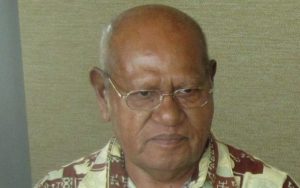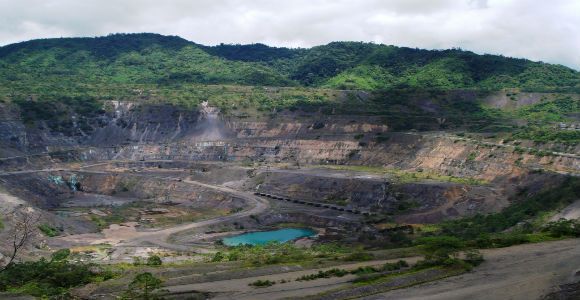The Autonomous Bougainville Government wants to put the operation of the giant Panguna copper mine out to international tender as soon as possible, President John Momis tells Business Advantage PNG. But key considerations—including the exploration licence, the equity structure, landowner rights and dividends and the rehabilitation of the mine—must be decided first.
Re-opening the Panguna copper mine is potentially extremely lucrative for the Autonomous Region of Bougainville in Papua New Guinea. The mine was closed in 1989 at the start of a two-year civil war—prompted by landowner concerns over the damage to the local environment and the returns they were receiving.
The cost of rehabilitating the mine was estimated in 2014 to be about A$6 billion (K13.72 billion), and revenues for the life of the mine was estimated to be $A75 billion (K177 billion).
During the period it operated, 1972–1989, Panguna provided more than 45 per cent of PNG’s national export revenue, and was the biggest single contributor to government coffers.
Shareholding

Bougainville President, John Momis. Credit: RNZI.
But the first consideration in re-opening the mine is the shareholding says John Momis, the President of the Autonomous Bougainville Government (ABG).
He tells Business Advantage PNG this became an issue after Rio Tinto walked away in June, dividing its shareholding in Bougainville Copper Ltd (BCL) equally between the ABG and the national government.
This week, Prime Minister Peter O’Neill reportedly said the government would give its shares to landowners, drawing the ire of Momis, who believes the ABG should be given those shares, giving it a majority shareholding.
‘I think in general the landowners support the ABG’s option that the shares should be given to the ABG to be distributed to the landowners under our own mining law,’ he says.
O’Neill has not yet said which of the nine landowner groups would be given the national government’s 17 per cent shares in BCL, nor how those shares would be distributed.
Share dilution
Momis says while the majority of Bougainville landowners support the ABG being given the 17 per cent shareholding, a minority support O’Neill. Momis says they are being ‘misled’.
‘When we invite a new developer, they will come with technology and capital and, of course, they will also want [a high level of] shareholding which means the current shareholders will have their shares diluted very much.’
Momis says the amount of shareholding an operator would have is ‘something we would have to negotiate with them.’
‘Under our proposal, our mining law says—it is a legal requirement—that the landowners (receive) five per cent free carry in a fully developed mine.’
‘But what we do know is that they will want equity and not just a small amount because they will be very powerful and the current shareholders will have their share diluted—particularly the 17 per cent if it goes to landowners.
‘The landowners may end up with nothing.
‘Under our proposal, our mining law says–it is a legal requirement—that the landowners (receive) five per cent free carry in a fully developed mine. Five per cent of a fully developed mine.
‘If the mine starts, it might expand and extend its operations into other areas, which would entail having more landowners. If the ABG held the shareholding it would take care of new landowners.’
Investment vehicle
Last month, the ABG issued a ‘show cause’ notice to BCL, as to why its exploration licence over Panguna should not be rescinded, after Rio ended its management agreement with BCL. Momis says the ABG has ‘not decided yet’ whether to rescind the licence.
Momis estimates it would take ‘something like K20 billion to reopen the mine.’
At the moment, BCL’s major asset is its mining data, which Momis agrees would be ‘useless if we took away the exploration licence’.
‘If we don’t have majority (ownership) then it would put us in a situation where we could not agree on access to the data and that doesn’t help us.
‘That’s why we are saying a win-win deal would be to accept our proposal and then allow BCL to unblock and make use of the data.’
Rehabilitation
Momis estimates it would take ‘something like K20 billion to reopen the mine.’ The process could take five years. An incoming mine operator may need to factor in this rehabilitation cost should proposed legal action against Rio to force it to pay for a clean up fail.
Momis says the legal action is the result of Rio refusing ‘to accept any responsibility for the legacy issues, such as environmental damage and the social disruption, health consequences’.
Copyright © 2016 Business Advantage International.


